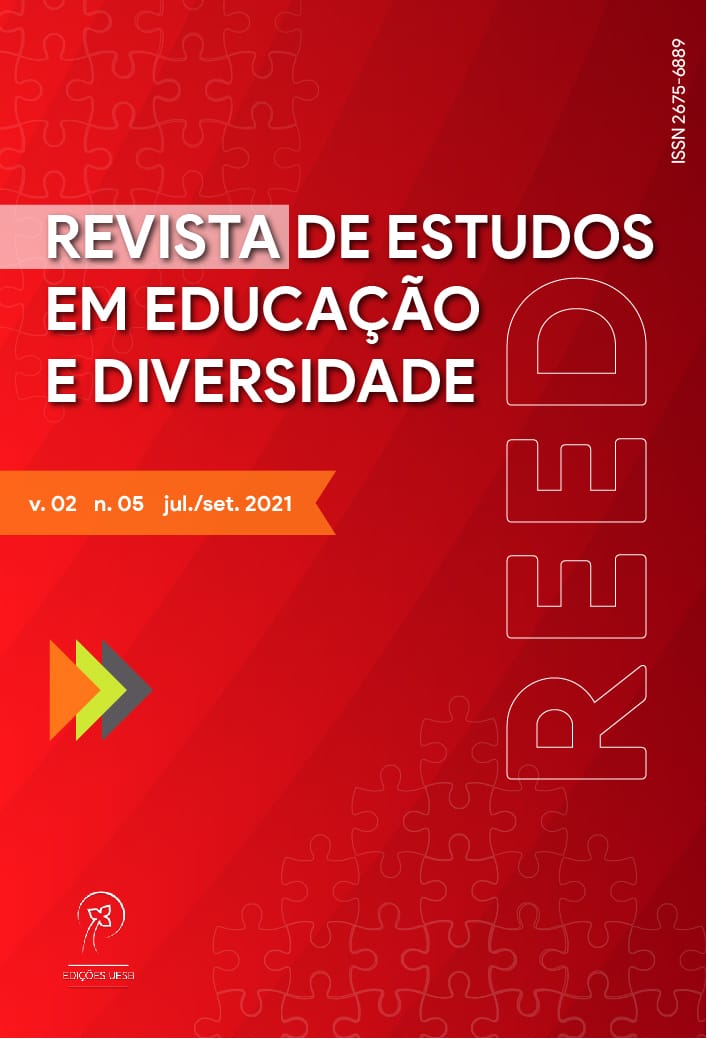CRITICAL EDUCATION AND IDEOLOGIZATION OF EDUCATION: PUTTING THE DOTS ON THE 'IS'
DOI:
https://doi.org/10.22481/reed.v2i5.8892Keywords:
Critical Education, Ideology in the Education, Schoolar Domination, Dialogic Discourse Theory, bourAbstract
This article discusses the place of ideological ideas in Brazilian classrooms. Therefore, the argumentation will begin in the adversarial position of two notional fronts concerning the issue: the first will be Critical Education, understanding of human doing as ideological, while the second is the Ideologization of Education, defender of the educating praxis as neutral and neutralizing. Beforehand, this discussion is clarified as a fiduciary of the Dialogic Theory of Discourse, which defends human actions as signs and of these as ideological materiality. Therefore, assuming this theoretical current, we also turn to Freire (2011) to support the place of ideology in the school experience, arguing not only its presence, but its effects, since the crux of the question should be whether the oriented ideology to schools promotes inclusion and citizenship or marginalization and violence. Therefore, according to the epistemologies of Bakhtin (1990) and Volochinov (1988) on ideology, and of Bourdieu (1989) and Saint Martin (2003) on school, it is intended to unveil the fallacy of the Neutrality Paradigm and its harmful effects to school training. On the other hand, it will advocate a formative-critical praxis aimed at the collective construction of a citizen societal statute, in opposition to the imposing school experiences of normative models obedient to the status quo ratifying perverse social asymmetries.
Downloads
References
BAKHTIN, M. Questões de Literatura e Estética. São Paulo: Hucitec: 1990.
BOURDIEU, P. La distinction, Paris: Minuit, 1979.
BOURDIEU, P. La Noblesse d 'état, Paris: Minuit, 1980.
BOURDIEU, P. O poder simbólico. Rio de Janeiro: Bertrand Brasil, 1989.
FARACO, C. A. Linguagem & Diálogo: as idéias lingüísticas do círculo de Bakhtin. Curitiba: Criar Edições, 2003.
FARACO, C. A. Linguagem e diálogo: as idéias linguísticas do círculo de Bakhtin. 2. ed. Curitiba: Criar, 2006.
FOUCAULT, M. A arqueologia do saber. Trad. Luiz Felipe Baeta Neves. 7. ed. Rio de Janeiro: Forense Universitária, 2008.
FREIRE, P. Pedagogia do Oprimido. Rio de Janeiro: Ed. Paz e Terra, 2011.
FREIRE, P. Pedagogia da Autonomia. São Paulo: Paz e Terra, 1997.
FREIRE, Paulo. Conscientização: teoria e prática da libertação – uma introdução ao
pensamento de Paulo Freire. 4. ed. São Paulo: Moraes, 1980.
HENRIQUES, E. Se língua é poder, ensinar língua consiste em quê?. In.: MONTENEGRO, R. K. A. Educação: possibilidades e caminho. Campo Grande: Editora Inovar, 2019. 513p.
NARZETTI, C. A filosofia da linguagem de V. Voloshinov e o conceito de ideologia. Alfa, São Paulo, v. 57, n. 2. p. 367-388, 2013. Disponível em: https://periodicos.fclar.unesp.br/alfa/article/view/4646. Acesso em: 04 abr. 2021.
PERELMAN, C.; OLBRECHTS-TYTECA, L. Tratado da Argumentação – A Nova Retórica. São Paulo: Martins Fontes, 1996.
SAINT MARTIN, M. Dominação Social, Dominação Escolar. Educação e Realidade. v. 28, n. 1. p. 21-29. jan/jun. 2003. Disponível em: https://seer.ufrgs.br/educacaoerealidade/article/view/25659. Acesso em: 04 abr. 2021.
VOLOSHINOV, V. [BAKHTIN, M.]. Marxismo e filosofia da linguagem: problemas fundamentais do método sociológico na ciência da linguagem. Tradução de Michel Lahud e Yara Frateschi. São Paulo: HUCITEC, 1979.
VOLOCHINOV, V. N. Marxismo e filosofia da linguagem. Problemas fundamentais do método sociológico na ciência da linguagem 4 ed. Tradução por Michel Lahud e Yara Frateschi Vieira. São Paulo: Hucitec, 1988.
Downloads
Published
How to Cite
Issue
Section
License
Copyright (c) 2021 Revista de Estudos em Educação e Diversidade - REED

This work is licensed under a Creative Commons Attribution 4.0 International License.
You are free to:
Share - copy and redistribute the material in any medium or format; Adapt - remix, transform, and build from the material for any purpose, even commercially. This license is acceptable for Free Cultural Works. The licensor cannot revoke these freedoms as long as you follow the terms of the license.
Under the following terms:
Attribution - You must appropriately give credit, provide a link to the license, and indicate if any changes have been made. You may do so in any reasonable way, but not in a way that suggests that you or your use is endorsed by the licensor.
There are no additional restrictions - You cannot apply legal terms or technological measures that legally restrict others to make any use permitted by the license.






